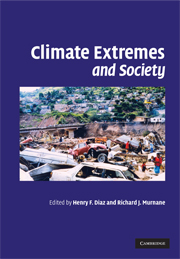Book contents
- Frontmatter
- Contents
- List of contributors
- Foreword
- Preface
- The significance of weather and climate extremes to society: an introduction
- I Defining and modeling the nature of weather and climate extremes
- 1 Definition, diagnosis, and origin of extreme weather and climate events
- 2 Observed changes in the global distribution of daily temperature and precipitation extremes
- 3 The spatial distribution of severe convective storms and an analysis of their secular changes
- 4 Regional storm climate and related marine hazards in the Northeast Atlantic
- 5 Extensive summer hot and cold extremes under current and possible future climatic conditions: Europe and North America
- 6 Beyond mean climate change: what climate models tell us about future climate extremes
- 7 Tropical cyclones and climate change: revisiting recent studies at GFDL
- II Impacts of weather and climate extremes
- Index
- Plate section
- References
1 - Definition, diagnosis, and origin of extreme weather and climate events
Published online by Cambridge University Press: 14 September 2009
- Frontmatter
- Contents
- List of contributors
- Foreword
- Preface
- The significance of weather and climate extremes to society: an introduction
- I Defining and modeling the nature of weather and climate extremes
- 1 Definition, diagnosis, and origin of extreme weather and climate events
- 2 Observed changes in the global distribution of daily temperature and precipitation extremes
- 3 The spatial distribution of severe convective storms and an analysis of their secular changes
- 4 Regional storm climate and related marine hazards in the Northeast Atlantic
- 5 Extensive summer hot and cold extremes under current and possible future climatic conditions: Europe and North America
- 6 Beyond mean climate change: what climate models tell us about future climate extremes
- 7 Tropical cyclones and climate change: revisiting recent studies at GFDL
- II Impacts of weather and climate extremes
- Index
- Plate section
- References
Summary
Condensed summary
Extreme weather and climate events are a major source of risk for all human societies. There is a pressing need for more research on such events. Various societal changes, such as increased populations in coastal and urban areas and increasingly complex infrastructure, have made us potentially more vulnerable to such events than we were in the past. In addition, the properties of extreme weather and climate events are likely to change in the twenty-first century owing to anthropogenic climate change.
The definition, classification, and diagnosis of extreme events are far from simple. There is no universal unique definition of what is an extreme event. This chapter discusses these issues and presents a simple framework for understanding extreme events that will help enable future work in this important area of climate science and global reinsurance.
Introduction
Human society is particularly vulnerable to severe weather and climate events that cause damage to property and infrastructure, injury, and even loss of life. Although generally rare at any particular location, such events cause a disproportionate amount of loss.
In this chapter, I attempt to describe a framework for classifying, diagnosing, and understanding extreme weather and climate events. The multidimensional aspect of complex extreme events will be discussed, and statistical methods will be presented for understanding simple extreme events. Some preliminary ideas about the origin of extreme events will also be presented.
Definition of extreme events
Extreme events are generally easy to recognize but difficult to define. This is due to several reasons.
- Type
- Chapter
- Information
- Climate Extremes and Society , pp. 11 - 23Publisher: Cambridge University PressPrint publication year: 2008
References
- 72
- Cited by



